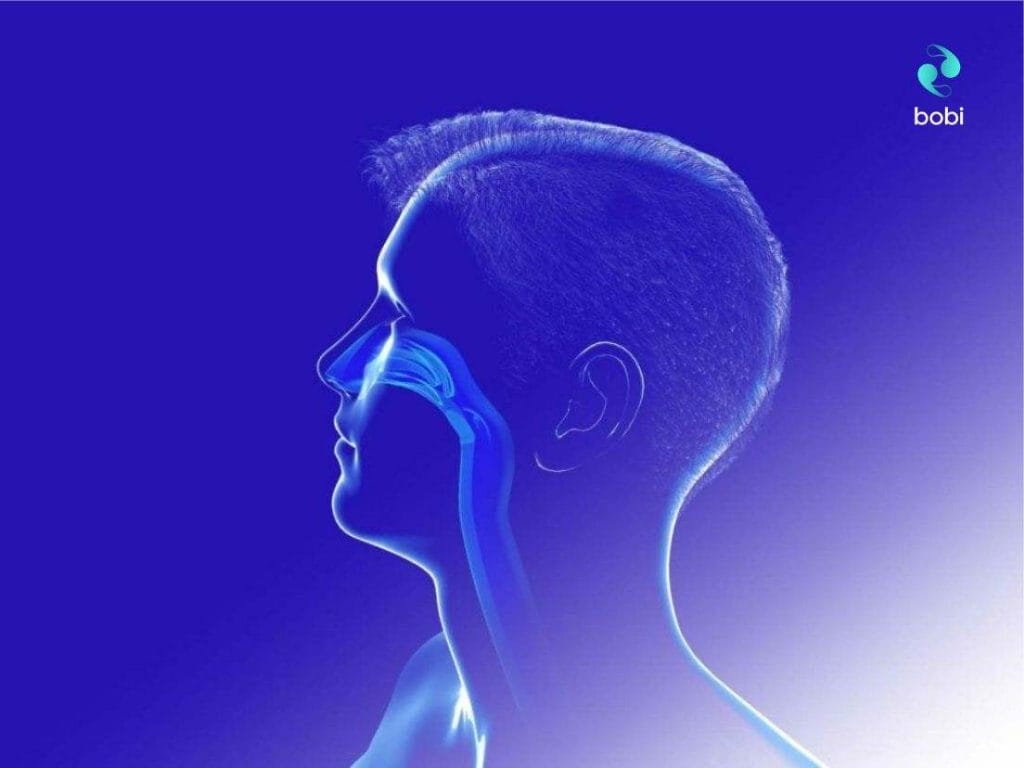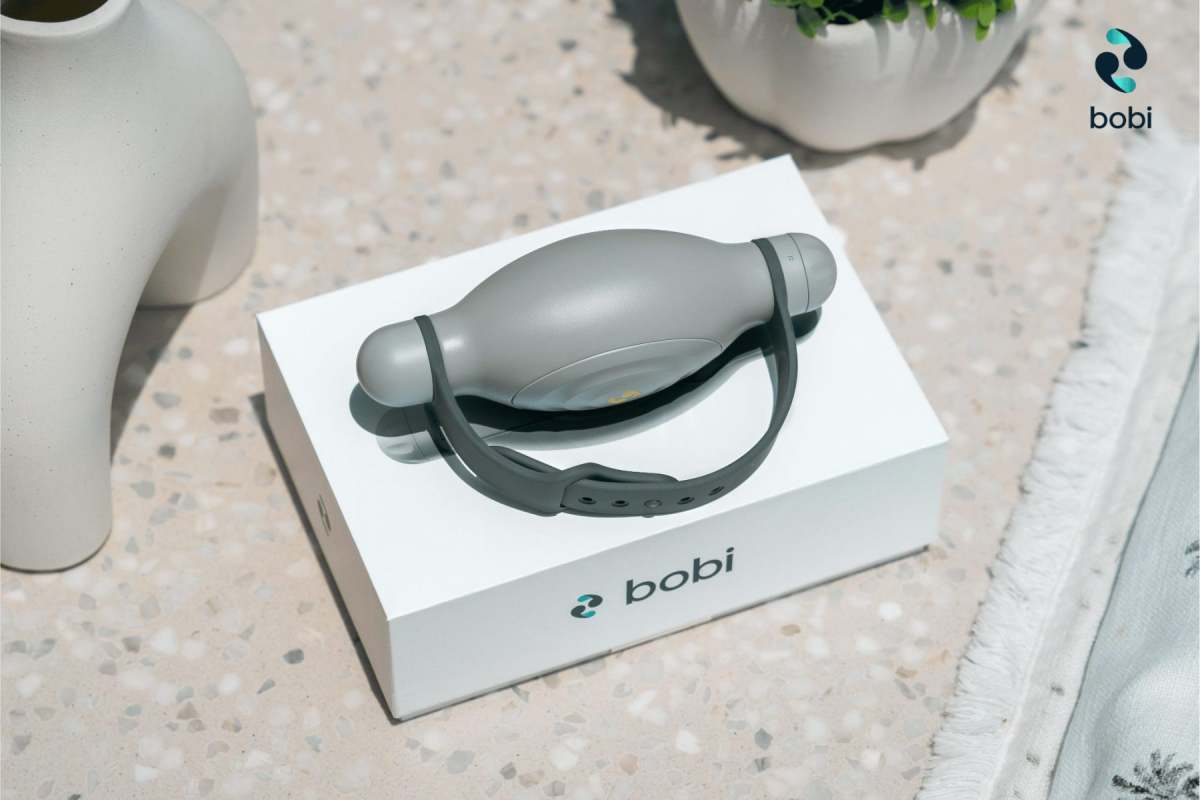
Breathing is one of the most fundamental and essential functions of our body. But did you know that the way we breathe can have a profound impact on our health and well-being? Specifically, nasal breathing benefits (or nose breathing) are both physical and mental, these include enhanced athletic performance and better sleep quality among others.
In this blog, we will unravel the mysteries of nasal breathing, explore the science behind it and compare it to mouth breathing. We will also discuss the numerous benefits of nasal breathing, especially for those with respiratory conditions, and provide an overview of how it can improve your overall health. Additionally, we will introduce you to bobi _ a revolutionary new device that can help improve your breathing habits and enhance your wellness journey.
When it comes to oxygenating your body, nose breathing takes centre stage. By inhaling through your nose, you allow the air to pass through the intricate network of blood vessels and tiny hairs inside your nostrils, which filter out impurities and allergens. This process ensures that you’re taking in clean, moistened air, free from pollutants.
Additionally, nasal breathing plays a crucial role in the production of nitric oxide, a molecule that helps lower blood pressure, boost immunity, and improve overall cardiovascular health. By practising diaphragmatic or abdominal breathing, you enhance respiratory function and increase lung capacity. This technique involves taking slow, deep breaths, allowing your diaphragm to fully expand and contract. Not only does it optimize oxygen intake, but it also promotes a sense of mindfulness and relaxation.
The science behind nasal breathing is fascinating and highlights the incredible functions of our nasal cavity. When we breathe through our nose, the air is filtered and humidified, thanks to the tiny hairs called cilia that line the nasal passage. These cilia help remove foreign particles and allergens, including pollen, protecting our respiratory system from dryness and lack of moisture.
Nose breathing also has a direct impact on our cardiovascular health. Research shows that it can lower blood pressure and heart rate, promoting overall well-being. Additionally, nose breathing plays a crucial role in supporting our immune system by preventing unfiltered air and potential pathogens from entering our body.
On the other hand, mouth breathing can have negative consequences. It can lead to oral health issues like bad breath, dry mouth, and even tooth decay. It also bypasses the filtration, humidification, and warming process of the nasal cavity, exposing the respiratory system to unfiltered air and causing irritation. This can increase the risk of allergic reactions and respiratory illnesses.
Incorporating nose breathing exercises, such as abdominal breathing (also known as belly breathing), can have numerous benefits for our physical and mental health.
Whether you’re an athlete looking to improve your performance or someone seeking to enhance your overall wellness, incorporating nose breathing into your daily routine can make a significant difference.
When it comes to breathing, there is an ongoing discussion relating to the impact of nasal breathing versus mouth breathing. Understanding the differences between these two methods is essential for optimizing our respiratory health. While mouth breathing may be more common, especially during exercise or when experiencing congestion, it can have negative effects on sleep quality and may even be connected to respiratory issues like asthma. On the other hand, nose breathing promotes better oxygenation and carbon dioxide balance, resulting in improved overall health and well-being.
By breathing through the nose, we filter unfiltered air, benefit from the warming and moisturizing effects of nasal passages, and activate the diaphragm for more efficient respiration. Additionally, nasal breathing has been linked to increased oxygen intake, better athletic performance, and reduced chances of sleep disorders like obstructive sleep apnea. So, the debate between nose breathing vs mouth breathing is one that highlights the numerous benefits of nose breathing for our physical and mental health.
The nasal cavity and airways play a crucial role in our breathing process. The septum, a thin wall of cartilage, separates the two sides of the nasal cavity and helps direct the airflow. However, a deviated septum can lead to impaired nasal breathing. Nasal congestion and allergies can also affect our breathing patterns, making it difficult to breathe through the nose. Proper airflow through the nostrils is essential for optimal oxygenation of the body. It filters the air, moisturizes it, and warms it before it reaches the lungs. By understanding these differences, we can appreciate the importance of nasal breathing for overall health and well-being.
Discover the many benefits of nasal breathing, including its impact on reducing stress and promoting relaxation. Nasal breathing has been found to have a significant impact on maintaining a healthy respiratory system, as it filters and humidifies the air we breathe, preventing potential health issues such as dry mouth and bad breath. Furthermore, nose breathing is closely linked to improved sleep quality, as it helps regulate the breath and ensures sufficient oxygen intake during rest.
By breathing through the nose, we also enhance our immune system, filtering out allergens and reducing the risk of allergic reactions.
Additionally, nasal breathing can help reduce inflammation in the respiratory system and alleviate symptoms associated with allergies. It is also worth mentioning that slow breathing at around 6 breaths per minute is linked with improved response to stress caused by low oxygen levels and the preservation of healthy blood pressure responses in well individuals, people at high altitudes, and people with heart failure and hypertension. With its numerous benefits, nose breathing is a powerful tool for overall well-being and vitality.
Discover the remarkable effects of nasal breathing on your physiological health. Experience improved blood oxygenation and circulation, reduced congestion and sinus issues, and enhanced respiratory efficiency. Promote healthy lung function and enjoy optimal oxygen exchange through the power of nasal breathing.
Breathing through your nose can have a surprisingly positive effect on your mental health. It can alleviate stress and anxiety by activating the parasympathetic nervous system. By doing so, it helps to regulate our heart rate, blood pressure, and breathing rhythm, which in turn promotes feelings of calmness and relaxation.
Nose breathing can also enhance our focus and concentration levels. Inhaling through the nose stimulates the olfactory nerve, which is closely linked to the limbic system of the brain responsible for regulating emotions and memory. This process can help with better recall of information and increased productivity. Moreover, nasal breathing promotes mindfulness by drawing your attention to your breath and allowing you to stay present in the moment.
Incorporating nasal breathing into your daily routine has many benefits for overall mental well-being. It is an effective way to regulate the nervous system and promote a sense of calmness and relaxation. Therefore, taking a few minutes out of your day to practice nasal breathing can make a significant difference in improving your mental health.
When it comes to enhancing athletic performance, nasal breathing plays a crucial role in reducing exercise-induced asthma and bronchoconstriction. By practicing nasal breathing during exercise, athletes can improve their oxygen uptake, leading to increased endurance and stamina. The connection between nasal breathing and efficient energy utilization is also significant, as it allows the body to utilize oxygen more effectively, resulting in improved performance and respiratory rate.
Nasal breathing is not only beneficial during the workout but also in the recovery process. It helps reduce muscle fatigue and promotes faster recovery, enabling athletes to bounce back quicker. To incorporate nasal breathing into training, athletes can focus on techniques such as abdominal breathing and alternate nostril breathing. These methods ensure that enough oxygen is taken in while exercising, maximizing athletic potential.

Quality sleep is essential for our overall well-being, and research supports the fact that nasal breathing plays a crucial role in achieving just that. Practising nose breathing during sleep can prevent sleep apnea and snoring, which can disrupt your sleep patterns. Additionally, the connection between mouth breathing and sleep disorders highlights the importance of promoting nose breathing for a restful night’s sleep.
Mouth breathing may solve the immediate and essential problem of getting enough air, but it can become a hard-to-break habit that can cause sleep disorders, dental problems, and facial structure differences.
There are various techniques you can incorporate to enhance nose breathing during sleep. One effective technique is to practice abdominal breathing or belly breathing, also known as diaphragmatic breathing or abdominal breathing. Here, you focus on taking deep breaths using your diaphragm. This helps to promote airflow through your nose and reduce the likelihood of mouth breathing. Another technique is alternate nasal breathing, which involves inhaling and exhaling through one nostril at a time, helping to clear any congestion and promote unobstructed airflow.
In addition to improving sleep quality, nose breathing also contributes to better sleep hygiene. By breathing through your nose, you filter and humidify the air before it reaches your lungs, preventing issues like dry mouth and bad breath. Moreover, nose breathing ensures a steady supply of oxygen, enhancing respiratory health and reducing the risk of allergies and infections.
By focusing on nose breathing during sleep, you can experience its numerous benefits, ranging from improved sleep quality to enhanced overall well-being. So, make an effort to prioritize nose breathing and enjoy a more restful and rejuvenating sleep.

Discover the transformative power of bobi in enhancing your breathing habits. This innovative device promotes nasal breathing during daily activities, improving respiratory health and overall well-being. With techniques and exercises tailored to optimize nasal breathing, bobi seamlessly integrates into your daily routine for optimal results.
bobi’s functionality lies in its ability to optimize your breathing mechanics. By encouraging diaphragmatic and abdominal breathing, bobi facilitates deep and full inhalation and exhalation. This technique, also known as belly breathing or abdominal breathing, allows you to take in more oxygen, slow down your respiration rate, and activate your parasympathetic nervous system, promoting a state of calm and relaxation.
Whether you’re an athlete looking to enhance your athletic performance or someone seeking better overall health, bobi can be your breathing companion. By utilizing techniques like alternate nostril breathing and belly breathing, bobi helps open up your airways, strengthen your respiratory muscles, and improve lung capacity.
It’s a tool that empowers you to take control of your breathing habits and harness the numerous benefits of optimal nasal breathing.
Explore the unique features and benefits of bobi, the perfect companion for optimizing nasal breathing. Improve sleep quality, reduce snoring, and enhance respiratory wellness with bobi’s compact design and advanced technology. Experience convenient on-the-go breathing exercises and enjoy proper airflow maintenance and allergy reduction.
Nasal breathing plays a vital role in promoting overall health and well-being. By incorporating bobi into your breathing routine, you can unlock a host of nasal breathing benefits. From improved respiratory function to reduced snoring, bobi has the power to elevate your breathing techniques. We invite you to explore the transformative effects of nose breathing with bobi and experience the difference it can make in your respiratory health.
Take a deep breath and dive into the world of nose breathing with confidence. Enhance your athletic performance, improve sleep quality, and reduce allergies with the help of bobi. Don’t miss out on the opportunity to optimize your breathing habits and embrace a healthier lifestyle. Join us on this journey towards better breathing and discover the power of nasal breathing with bobi.

Nasal breathing is essential for filtering and humidifying the air we breathe, ensuring we take in clean, moistened air free from pollutants. It also plays a vital role in the production of nitric oxide, which has numerous health benefits, including lowering blood pressure and boosting immunity.
While mouth breathing can lead to issues like bad breath, dry mouth, and exposure to unfiltered air, nasal breathing filters and humidifies the air, promotes better oxygenation, and has been linked to increased oxygen intake, better athletic performance, and reduced chances of sleep disorders.
Nasal breathing can alleviate stress and anxiety by activating the parasympathetic nervous system. It also enhances focus and concentration levels, promotes mindfulness, and can help with better recall of information.
Nasal breathing can reduce exercise-induced asthma and bronchoconstriction. It also improves oxygen uptake, leading to increased endurance and stamina. Furthermore, it aids in efficient energy utilization and promotes faster recovery after workouts.
Bobi is a revolutionary device designed to promote nasal breathing during daily activities, improving respiratory health and overall well-being. It encourages diaphragmatic and abdominal breathing, facilitating deep inhalation and exhalation, and offers techniques to optimize nasal breathing.
Stay updated on what's happening at bobi, and all things breathing, anxiety and mental wellness.